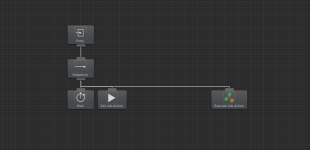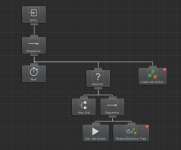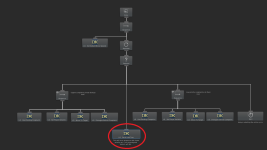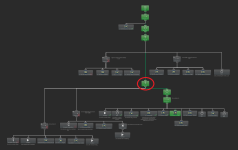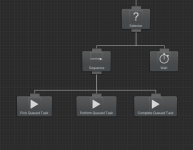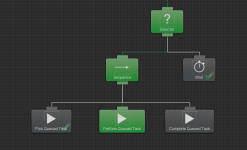MrMemeseeks
New member
Hi all,
I'm implementing BD and what I would like to have is the following: I have classic "AI agents" who should be able to pickup different tasks/jobs (base building style).
The execution of those jobs is different depending on the type of job.
So what I would like to do is to separate those jobs into separate External Behavior Trees.
The agent has its own behavior tree with it's generic behavior. When an agent is available it should pickup a job.
My main questions are a bit in how to configure those jobs? My initial line of thought is that I have a JobManager which has a list of jobs that are ready to pick up (things like build a building, chop a tree). The jobs in this list should contain an "instance?" of the behavior tree of the job. And when an agent is picking up the job, it will assign the behavior tree to the "External Behavior Tree" node in the agent's own behavior. I have the feeling that I got the gist of it but i'm not really there yet.
Main questions are,
- How to configure the jobs? Including parameters that they need?
- How would I add jobs to the job manager list? Do I need to instantiate an instance of the job's behavior tree?
So the main thing is that I want to create jobs at runtime > Add them to a list > Agent should be able to fetch job from the list and execute it.
Thanks in advance ^^
I'm implementing BD and what I would like to have is the following: I have classic "AI agents" who should be able to pickup different tasks/jobs (base building style).
The execution of those jobs is different depending on the type of job.
So what I would like to do is to separate those jobs into separate External Behavior Trees.
The agent has its own behavior tree with it's generic behavior. When an agent is available it should pickup a job.
My main questions are a bit in how to configure those jobs? My initial line of thought is that I have a JobManager which has a list of jobs that are ready to pick up (things like build a building, chop a tree). The jobs in this list should contain an "instance?" of the behavior tree of the job. And when an agent is picking up the job, it will assign the behavior tree to the "External Behavior Tree" node in the agent's own behavior. I have the feeling that I got the gist of it but i'm not really there yet.
Main questions are,
- How to configure the jobs? Including parameters that they need?
- How would I add jobs to the job manager list? Do I need to instantiate an instance of the job's behavior tree?
So the main thing is that I want to create jobs at runtime > Add them to a list > Agent should be able to fetch job from the list and execute it.
Thanks in advance ^^
